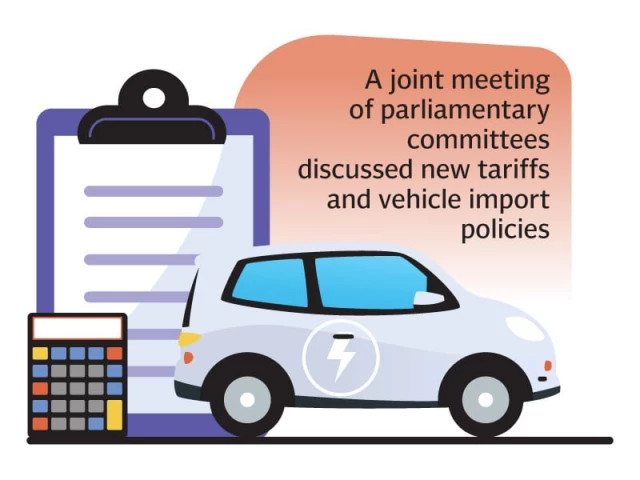[ad_1]
ISLAMABAD:
A government official said on Monday that the import of accidental cars will be banned, and a 40% new tax will be imposed at the time of opening commercial imports of used cars next month to protect the local industry, delaying any benefits to the consumers from trade liberalisation.
But the local assemblers have claimed that despite trade liberalisation, there will not be any reduction in prices, as the government charges 30% to a whopping 61% of the total price in taxes on the locally assembled cars.
In a policy statement during a joint meeting of the Senate standing committees of finance and industry, Joint Secretary Trade Policy Mohammad Ashfaq said that the import of accidental and low-quality vehicles would not be allowed. He said that under the understanding reached with the International Monetary Fund (IMF), there would be an additional tariff protection of 40% compared to the new vehicles from this fiscal year.
The joint secretary further stated that the government has also not yet decided whether the special schemes for car imports would continue or end after lifting restrictions on commercial imports.
At present, the commercial import of cars is not allowed, and cars are imported by misusing the schemes of transfer of residence, baggage, and gift. These imports meet one-fourth of the total local demand, as consumers prefer imported mildly accidental used vehicles over locally produced cars.
The IMF has imposed a condition on Pakistan to allow the commercial import of used cars of up to five years from September and then completely lift age and other restrictions from July next year.
Pakistan Automotive Manufacturers Association (PAMA) and Pakistan Association of Automotive Parts and Accessories Manufacturers (PAAPAM) have started lobbying against the government and IMF decisions, and also gave presentations to the standing committee.
In the next four years, the 40% additional import tariff would be brought to zero on the import of used and old vehicles. In the future, the import of six to eight-year-old vehicles would also be allowed. The quantity and standards would be maintained to ensure that old and used vehicles do not create environment-related problems in the country, said Ashfaq.
Under the IMF programme, Pakistan is bound to cut its import tariffs from 20.2% to 9.7% over five years – a 52% drop, according to the joint secretary’s presentation. In the first year (FY26), the tariff rate would drop to 15.7%, cutting the protection wall by 22.3%. This will be achieved by reducing average customs duty to 11.2%, additional customs duty to 1.8%, and regulatory duty to 2.7%.
Additional customs duties will be phased out in four years, regulatory duties in five years, and exemptions within five years. The number of slabs will shrink to four, with a top rate of 15% within five years.
Auto sector products with 35% customs duty are covered under the Auto Policy. These duties will be phased out from July 1, 2026.
“I do not understand what the IMF has to do with the consumers,” remarked Senator Aon Abbas, chairman of the standing committee on industry, while commenting on the IMF’s condition to open commercial imports.
The Chief Executive Officer of Indus Motors, Ali Asghar Jamali, made the presentation on behalf of the local assemblers. He told the committee that the prices were high because of government taxes, which range from 30% to 61% of the total price of the vehicle.
Jamali said that the tax component in the case of a small car is 30%, including Rs32,935 of the recently introduced levy on combustion engines.
In the case of the Altis, taxes account for 44% of the vehicle price and increase to 60% in the case of the LCV pickup, he added. Against a total price of Rs18.8 million, the government charges Rs11.3 million in taxes, said Jamali.
The SUV Fortuner’s total price is Rs24.42 million, and Rs14.8 million or 61% is the cost of taxes, revealed the chief executive.
“Our marketing has been bad, and everyone feels that we are the bad people,” admitted Jamali after members of the committees criticised the local assemblers for charging very high prices and giving low-quality cars.
He plainly stated that it was not the responsibility of the private sector to create jobs, as job creation is the function of the government – a statement contrary to Finance Minister Muhammad Aurangzeb’s stance that the private sector should create jobs.
Jamali said that under the new policy, it would be lucrative for the local manufacturers to import used cars and sell them instead of manufacturing them.
The representative of Pak-Suzuki Motors, who happens to be a Japanese national, said that “producing locally is very costly and a lot of efforts have to be made, and it is now better to stop production and easier to import and sell the cars.”
Senator Qadir supported the government’s policy to withdraw protection, which according to him will bring efficiency and help improve safety standards.
Jamali and the representative of Pak-Suzuki Motors admitted that compared to six safety bags, there were only two bags in locally produced cars. But both claimed that the quality of the local and imported vehicles was the same, which the committee members did not agree with.
[ad_2]
Source link
